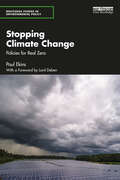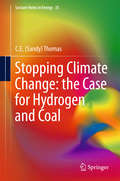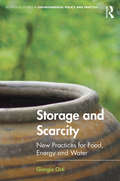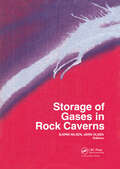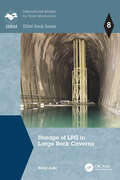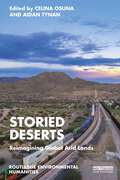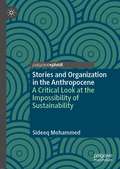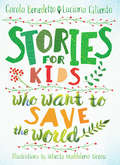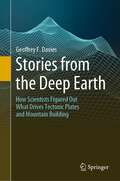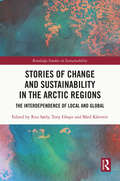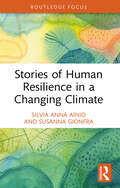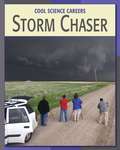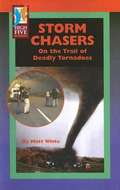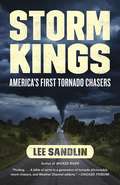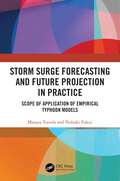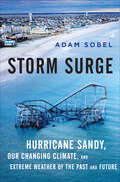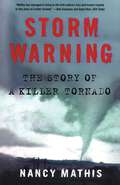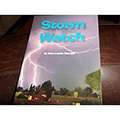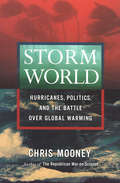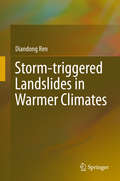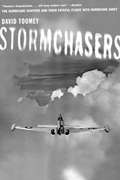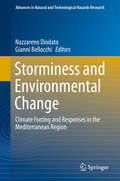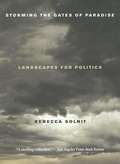- Table View
- List View
Stopping Climate Change: Policies for Real Zero (Routledge Studies in Environmental Policy)
by Paul EkinsWritten by one of the leading experts in the field, Paul Ekins, Stopping Climate Change provides a comprehensive overview of what is required to achieve ‘real zero’ carbon dioxide emissions by 2050, and negative emissions thereafter, which is the only way to stop human- induced climate change. This will require innovation in socio-technical systems, and in human behaviour, on an unprecedented scale. Stopping Climate Change describes the changes required to meet this goal: in technologies, social institutions and individual activities. Paul Ekins examines in detail issues around the supply and demand of energy and materials, and the efficiency of their use. It also analyses greenhouse gas removal technologies, offsetting and geoengineering, and plots the reduction of the non- CO2 greenhouse gas-emitting activities. Having set out the changes required, Ekins considers the economic implications, in terms of both the innovation and investments that are necessary to bring them about, and the effects that these are likely to have on national economies. The evidence presented points clearly to the economic impacts of decarbonisation being positive for the majority of countries, and for the world as a whole, even before considering the benefits of avoided climate change. When the health benefits of stopping the burning of fossil fuels are factored in, the global net benefits of decarbonisation are unequivocal. Drawing on examples from the UK and Europe, but with wider relevance at a global scale, Stopping Climate Change clearly shows how determined policy action at different levels could stop climate change. It will be of great interest to students, scholars and policymakers researching and working in the field of climate change and energy policy.
Stopping Climate Change: Policies for Real Zero (Routledge Studies in Environmental Policy)
by Paul EkinsWritten by one of the leading experts in the field, Paul Ekins, Stopping Climate Change provides a comprehensive overview of what is required to achieve ‘real zero’ carbon dioxide emissions by 2050, and negative emissions thereafter, which is the only way to stop human- induced climate change.This will require innovation in socio-technical systems, and in human behaviour, on an unprecedented scale. Stopping Climate Change describes the changes required to meet this goal: in technologies, social institutions and individual activities. Paul Ekins examines in detail issues around the supply and demand of energy and materials, and the efficiency of their use. It also analyses greenhouse gas removal technologies, offsetting and geoengineering, and plots the reduction of the non- CO2 greenhouse gas-emitting activities. Having set out the changes required, Ekins considers the economic implications, in terms of both the innovation and investments that are necessary to bring them about, and the effects that these are likely to have on national economies. The evidence presented points clearly to the economic impacts of decarbonisation being positive for the majority of countries, and for the world as a whole, even before considering the benefits of avoided climate change. When the health benefits of stopping the burning of fossil fuels are factored in, the global net benefits of decarbonisation are unequivocal.Drawing on examples from the UK and Europe, but with wider relevance at a global scale, Stopping Climate Change clearly shows how determined policy action at different levels could stop climate change. It will be of great interest to students, scholars and policymakers researching and working in the field of climate change and energy policy.
Stopping Climate Change: the Case for Hydrogen and Coal
by C. E. Sandy ThomasThis book documents the advantages and limitations ofvarious electricity generation methods. It illustrates how both electricity andmotor fuel can be cost-effectively derived from coal, natural gas or other indigenousfuels, thereby eliminating our dependence on imported oil and the power of OPEC. It favours electricity generation systems powered exclusively by natural gas,coal, nuclear and renewables and motor vehicles powered by hydrogen(electricity from coal gasification with carbon capture and sequestration (CCS)and hydrogen as the fuel powering fuel-cell electric vehicles produced from naturalgas or by gasifying coal With CCS. ) Thebook also demonstrates that the US can meet the Climate Change goal of reducingall greenhouse gases by 80% below 1990 levels in both the transportation andelectric utility sectors using hydrogen and coal.
Storage and Scarcity: New practices for food, energy and water (Routledge Studies in Environmental Policy and Practice)
by Giorgio OstiIn an era of abundance, at least part of humanity has stopped thinking about the future provision of basic vital resources such water, energy and food. Storage actions, with all their variants whether real or imagined, are sources of innovation in the provision and treatment of crucial resources. This book deals with cases of water, food, energy and biodiversity storage as a response to a new era of scarcity. Examining multilevel storage policies, consumers’ practices and local organisations, author Giorgio Osti explores a variety of examples such as the need to stock agriculture produce, the industry and practices of food conservation, the role of artificial water basins in controlling floods and droughts and the development of batteries able to compensate for the intermittence of renewable energy sources. Storage and self-sufficiency can be achieved in many technical ways, at different territorial levels and according to different policies or philosophies. Being more a grasshopper or an ant - the two extreme positions - depends not only on the technologies available but also on different analyses of the environment and different attitudes to the future. This book offers an environmentalist perspective that uncovers hidden or absent activities of ultramodern societies that will be useful to students of environmental sociology as well as those researching and studying at the interface of environmental studies and geography.
Storage of Gases in Rock Caverns: Proceedings of the International Conference on Storage of Gases in Rock Caverns/Trondheim/26-28 June 1989
by BJØRN NILSEN; JØRN OLSENContains papers of a conference on [title] held in Trondheim, Norway, June 1989. The following storage concepts are considered: pressurized, compressed air energy, air cushion surge chambers, amonia products storage.
Storage of LPG in Large Rock Caverns (ISRM Book Series)
by Kenji AokiThis book uses actual construction projects as examples to elaborate the various technologies regarding groundwater control and air-tightness guarantees for the construction of large storage rock caverns in complicated geological conditions. It introduces the latest technologies to give hands-on experience of what to do in unexpected geological conditions, and provides insight into the design, construction and operation of underground facilities. The book is hence useful in feasibility studies, developments and other research into these underground facilities. Drawing on the experience gained from building Japan's largest LPG storage caves, Storage of LPG in Large Rock Caverns is a must-read for engineers, academics and students in the fields of rock mechanics, geotechnical engineering and related disciplines.
Storied Deserts: Reimagining Global Arid Lands (ISSN)
by Aidan Tynan Celina OsunaStoried Deserts makes a crucial and critical intervention in the field of environmental humanities by showcasing an emerging body of research on desert places from around the world.Deserts, despite dominant stereotypes of wasteland and barrenness, are culturally and ecologically abundant places. This edited volume sets out to reimagine the world’s desert places and the very concept of "the desert" itself, taking a boldly interdisciplinary and multicultural approach. Authors engage in literary ecocriticism and ecopoetics, film and visual studies, critical theory, personal and transdisciplinary reflection, creative practices, and historical scholarship. Through their diverse range of perspectives, contributors show how arid lands have been and can be understood as sites of narrative production, places where signs and imaginaries are born from the materialities of space and entanglement. In this way, this volume highlights how the storied matter of the Earth’s deserts informs lived realities, environmental histories, cinematic and literary imaginaries, political conflicts, and even intellectual categories such as "the human" and "the elemental".Ultimately, this book shows that reimagining desert places can help us to grapple with the epochal challenges of the Anthropocene. It is an important and engaging collection for scholars and students across disciplines that helps establish the value of desert humanities.
Stories and Organization in the Anthropocene: A Critical Look at the Impossibility of Sustainability
by Sideeq MohammedThis book is about the stories being told in the Anthropocene. Stories of irreparable damage being done to the global ecosystem, of sustainable growth, of dystopian collapse, of continued interspecies flourishing, of Gaia, and of accelerating capitalism’s dynamics in order to discover its outside. Stories of change. Stories of hope. Against them all, this book seeks to braid together a particular thread of storying in order to speak to the emergence of the mall at the end of the world; a space where a new politics of “spectral capitalism” is played out. In doing so, we reflect that there never was any outside to Capital, that it can live forever, its performances and spectacles being preserved despite global ecological collapse. This book seeks to understand the nascence of the mall at the end of the world and the new people, thoughts, and dreams that come with it.
Stories for Kids Who Want to Save the World
by Carola Benedetto Luciana CilientoSixteen biographies of extraordinary people--ranging from Sebastião Salgado to Björk and Greta Thunberg--who came of age fighting climate changeEvery person has a path in life, one that is intertwined with the fate of the earth. The life stories in this collection begin and end with that realization. First, as children, in different countries and eras, they witness how humans provoke environmental degradation. Each leads a life that not only minimizes their individual contribution to climate change at a local scale, but also that of their generation on a global scale. Then, as adults, they recognize the maturity and agency acquired at that moment which defined their lives. The biographies depict concrete initiatives that contribute to climate preservation, from a physicist who promotes organic farming techniques in India to a designer that only uses ecological fabrics and dyes in Italy. Rock climber Yvon Chouinard, biologist Rachel Carson, and designer Adriana Santanocito are included in this diverse cast of environmental activists. Together they show us that regardless of culture, class, or profession it is never too early or late to find your way to improve the world our children will inhabit. The stakes couldn't be higher: "Our house is on fire," as Greta Thunberg rightly said.
Stories from the Deep Earth: How Scientists Figured Out What Drives Tectonic Plates and Mountain Building
by Geoffrey F. DaviesPlate tectonics can drift continents and push up mountains, but what drives the plates? This is an insider’s account of how we answered questions posed over two centuries ago, and completed geology’s quest for a driving mechanism. Forging through confusing evidence, apparent contradictions and raging debates we arrived at not one but two mechanisms: sinking plates and rising plumes.
Stories of Change and Sustainability in the Arctic Regions: The Interdependence of Local and Global (Routledge Studies in Sustainability)
by Rita SørlyThis book presents stories of sustainability from communities in circumpolar regions as they grapple with environmental, economic and societal changes and challenges. Polar regions are changing rapidly. These changes will dramatically effect ecosystems, economy, people, communities and their interdependencies. Given this, the stories being told about lives and livelihood development are changing also. This book is the first of its kind to curate stories about opportunity and responsibility, tensions and contradictions, un/ethical action, resilience, adaptability and sustainability, all within the shifting geopolitics of the north. The book looks at change and sustainability through multidisciplinary and empirically based work, drawing on case studies from Norway, Sweden, Alaska, Canada, Finland and Northwest Russia, with a notable focus on indigenous peoples. Chapters touch on topics as wide ranging as reindeer herding, mental health, climate change, land-use conflicts and sustainable business. The volume asks whose voices are being heard, who benefits, how particular changes affect people’s sense of community and longstanding and cherished values plus livelihood practices and what are the environmental, economic and social impacts of contemporary and future oriented changes with regard to issues of sustainability? This volume will be of great interest to students and scholars of sustainability studies, sustainable development, environmental sociology, indigenous studies and environmental anthropology.
Stories of Human Resilience in a Changing Climate (Routledge Focus on Environment and Sustainability)
by Silvia Anna Ainio Susanna GionfraStories of Human Resilience in a Changing Climate offers a captivating glimpse into the human face of climate change.Despite extreme climate-related events witnessed globally, many struggle to connect such global phenomena to their own lives in a tangible way. As a result, there is still a strong disconnect between the general awareness of climate change and the sense of urgency that inspires action. This book fills a critical void in the field by sharing 11 real-life experiences across five continents of the world, featuring ordinary people facing and adapting to the consequences of climate change in its different forms. Through gripping accounts of a nomad having to relocate from the desert to the nearest city, an indigenous person fighting back for land rights, and a winemaker finding creative solutions to increasing heatwaves, among other stories, the book humanises the challenges of climate change. By weaving scientific data with personal stories, the chapters deliver a compelling call to move beyond mere acknowledgment of the problem towards transformative action that respects the balance of ecosystems, fosters sustainable practices, and redefines our relationship with nature. Overall, the book highlights the urgent need for global awareness on what ultimately represents one of the most pressing challenges of our time, leaving readers inspired and empowered to create a more sustainable and resilient future.This accessible and impactful book will be of great interest to students and scholars of climate change and environmental sciences and communication, as well as community leaders and NGOs wanting to understand practical examples and insights of climate change phenomena. Views and opinions expressed are those of the authors only and do not necessarily reflect those of the European Union or the European Commission.
Storm Chaser
by Mike Olbinski&“Olbinski chases storms . . . capturing lightning, tornadoes and dramatic cloud formations in images that convey the awesome power and beauty of nature.&” —International Business Times The storms that cross the Great Plains of North America each spring are some of nature&’s most spectacular. They can also be some of the most dangerous. Most people who live in areas susceptible to these storms keep a close eye on the weather reports and take cover or evacuate when one is on the way. Storm chasers keep an even closer eye on the weather data, but for a different reason: they don&’t run away when they see a storm approaching, they follow it! Professional photographer and Emmy Award winner, Mike Olbinski has chased storms throughout his native Arizona, as well as even further afield, including Texas, Oklahoma, Kansas, and Colorado. Whether he&’s photographing lightning, tornadoes or even cloud formations, his remarkable images are able to convey nature in its most dramatic and impressive forms. With over 100 stunning colour photographs, this book brings together some of Mike&’s most breathtaking images from the past five years as he describes his love of the open road and the thrill of capturing the perfect storm on film. &“These pictures are truly fascinating; they show just how small we are and how little control we have over the environment and that these storms can pack a wallop. For fans of weather and spectacular photos, this is the book for you.&” —San Francisco Book Review (5-star review) &“A striking series of breath-taking pictures of nature lashing out from apocalyptic skies.&” —Daily Mail Online
Storm Chaser (Cool Science Careers)
by Ann HeinrichsA group of storm chasers along the highway are filming a tornado as it rips its way across the landscape. Some storm chasers are ordinary people looking for a thrill, but many are meteorologists working to find out more about dangerous weather.
Storm Chasers: On the Trail of Deadly Tornadoes
by Matt WhiteExamines what a storm chaser is and how they track, observe, and document deadly weather, especially tornadoes, and discusses how severe weather develops and safety precautions to take in such storms.
Storm Kings: The Untold History of America's First Tornado Chasers
by Lee SandlinWith 16 pages of black-and-white illustrationsFrom the acclaimed author of Wicked River comes Storm Kings, a riveting tale of supercell tornadoes and the quirky, pioneering, weather-obsessed scientists whose discoveries created the science of modern meteorology. While tornadoes have occasionally been spotted elsewhere, only the central plains of North America have the perfect conditions for their creation. For the early settlers the sight of a funnel cloud was an unearthly event. They called it the "Storm King," and their descriptions bordered on the supernatural: it glowed green or red, it whistled or moaned or sang. In Storm Kings, Lee Sandlin explores America's fascination with and unique relationship to tornadoes. From Ben Franklin's early experiments to the "great storm war" of the nineteenth century to heartland life in the early twentieth century, Sandlin re-creates with vivid descriptions some of the most devastating storms in America's history, including the Tri-state Tornado of 1925 and the Peshtigo "fire tornado," whose deadly path of destruction was left encased in glass. Drawing on memoirs, letters, eyewitness testimonies, and archives, Sandlin brings to life the forgotten characters and scientists who changed a nation--including James Espy, America's first meteorologist, and Colonel John Park Finley, who helped place a network of weather "spotters" across the country. Along the way, Sandlin details the little-known but fascinating history of the National Weather Service, paints a vivid picture of the early Midwest, and shows how successive generations came to understand, and finally coexist with, the spiraling menace that could erase lives and whole towns in an instant.
Storm Surge Forecasting and Future Projection in Practice: Scope of Application of Empirical Typhoon Models
by Masaya Toyoda Nobuki FukuiThis accessible shortform book describes storm surge forecasting to enable port managers and practitioners to forecast these and mitigate their effects. This is particularly useful as global warming increases the severity of typhoons, particularly windstorms and storm surge disasters, globally.The authors first summarize the current status of typhoons and storm surges in practice. They also present a combination of the latest findings at the research level and at the practical level. Throughout the book, the authors carefully explain the use and limitations of empirical typhoon models that practitioners should learn from, including statistical, numerical, probabilistic, data-driven and coastal vulnerability models. They also explore artificial neural networks and convolutional neural networks and their use in such models. Finally, the book describes the potential for further development of empirical typhoon models (such as future climate experiments).This book is a vital resource that enables port managers to make effective and informed decisions when conducting storm surge forecasting in practice. It also contains useful insights for civil engineering students, especially those studying coastal engineering.
Storm Surge: Hurricane Sandy, Our Changing Climate, and Extreme Weather of the Past and Future
by Adam SobelWas Sandy a freak of nature, or the new normal?On October 29, 2012, Hurricane Sandy reached the shores of the northeastern United States to become one of the most destructive storms in history. But was Sandy a freak event, or should we have been better prepared for it? Was it a harbinger of things to come as the climate warms? In this fascinating and accessible work of popular science, atmospheric scientist and Columbia University professor Adam Sobel addresses these questions, combining his deep knowledge of the climate with his firsthand experience of the event itself.Sobel explains the remarkable atmospheric conditions that gave birth to Sandy and determined its path. He gives us insight into the science that led to the accurate forecasts of the storm from genesis to landfall, as well as an understanding of why our meteorological vocabulary failed our leaders in warning us about this unprecedented weather system—part hurricane, part winter-type nor'easter, fully deserving of the title "Superstorm."Storm Surge brings together the melting glaciers, the warming oceans, and a broad historical perspective to explain how our changing climate and developing coastlines are making New York and other cities more vulnerable. Engaging, informative, and timely, Sobel's book provokes us to think differently about how we can better prepare for the storms in our future.
Storm Warning: The Story of a Killer Tornado
by Nancy MathisA nail-biting, captivating look at tornados, from personal stories of those impacted by the natural disasters to the history of the struggle to understand this bewildering force of Mother Nature.May 3, 1999, is a day that Oklahomans will never forget. By the time the sun set over a ravaged plain, some 71 tornadoes had claimed around 11,000 homes and businesses and caused $1 billion in damage. One of them was a mile-wide monster of incredible power, the fiercest F5 twister to hit a metropolitan area, and whose 300 mph winds were the fastest ever recorded. Veteran journalist Nancy Mathis draws on many interviews to weave the story of those few terrifying hours that irrevocably changed the lives of many Oklahomans. Storm Warning features Kara Wiese, who fought to save her son from the fatal winds; and Charlie Cusack, who followed the tornado's progress on television until it came knocking on his front door. Amazingly, only thirty-eight people perished at the hands of the Oklahoma F5. Many lives were saved by the efforts of professionals such as Ted Fujita, the creator of the Fujita Scale and dubbed "Mr. Tornado" for his relentless pursuit to unravel a twister's mysteries; the oft-criticized but dogged government meteorologists; and Gary England, a resourceful TV weatherman whose tireless efforts prepared hundreds of people in the tornado's path.
Storm World: Hurricanes, Politics, and the Battle Over Global Warming
by Chris MooneyAn investigation into climate change and increasingly dangerous hurricanes from the New York Times–bestselling author of The Republican War on Science. A leading science journalist delves into a red-hot debate in meteorology: whether the increasing ferocity of hurricanes is connected to global warming. In the wake of Katrina, Chris Mooney follows the careers of leading scientists on either side of the argument through the 2006 hurricane season, tracing how the media, special interests, politics, and the weather itself have skewed and amplified what was already a fraught scientific debate. As Mooney puts it: &“Scientists, like hurricanes, do extraordinary things at high wind speeds.&” Mooney—a New Orleans native, host of the Point of Inquiry podcast, and author of The Republican Brain—has written &“a well-researched, nuanced book&” that closely examines whether we as a society should be held responsible for making hurricanes even bigger monsters than they already are (The New York Times). &“Mooney serves his readers as both an empiricist who gathers data and an analyst who puts it into context. The result is an important book, whose author succeeds admirably in both his roles.&” —The Plain Dealer &“Engaging and readable . . . Mooney catches real science in the act and, in so doing, weaves a story as intriguing as it is important.&” —Los Angeles Times Book Review &“Mooney has hit upon an important and controversial topic, and attacks it with vigor.&” —The Boston Globe &“An absorbing, informed account of the politics behind a pressing contemporary controversy.&” —Kirkus Reviews
Storm-triggered Landslides in Warmer Climates
by Diandong RenThis volume discusses the general physics of debris flows and various approaches to modeling - including the SEGMENT-Landslide approach - as well as the pros and cons of these approaches and how other approaches are sub-sets of the SEGMENT-Landslide approach. In addition, this volume will systematically unify the concepts of vadose zone hydrology and geotechnical engineering, with special emphasis on quantifying ecosystem consequences of storm-triggered landslides in a warmer climate setting. The reader will find a comprehensive coverage of concepts ranging from hillslope hydrology, porous granular material rheology and the fundamentals of soil properties, to state-of-the-art concepts of enhanced hydrological cycle with climate warming and a discussion of new approaches for future research.
Stormchasers: The Hurricane Hunters and Their Fateful Flight into Hurricane Janet
by David ToomeyFifty years after Isaac's Storm, a riveting story of the first Hurricane Hunters, and the one crew who paid the ultimate price. "In a virtual age when tempests are monitored by global positioning and The Weather Channel, Stormchasers reminds us that our first understanding of hurricanes was directly built on the risks and sacrifices of living, breathing heroes," writes Hampton Sides (author of Ghost Soldiers). In September 1955, Navy Lieutenant Commander Grover B. Windham and a crew of eight flew out of Guantánamo Bay into the eye of Hurricane Janet swirling in the Caribbean: a routine weather reconnaissance mission from which they never returned. In the wake of World War II, the Air Force and the Navy had discovered a new civilian arena where daring pilots could test their courage and skill. These Hurricane Hunters flew into raging storms to gauge their strength and predict their paths. Without computer, global positioning, or satellite support, they relied on rudimentary radar systems to locate the hurricane's eye and estimated the drift of their aircraft by looking at windblown waves below. Drawing from Navy documents and interviews with members of the squadron and relatives of the crew, Stormchasers reconstructs the ill-fated mission of Windham's crew from preflight checks to the chilling moment of their final transmission.
Storminess and Environmental Change
by Nazzareno Diodato Gianni BellocchiThis book describes recent developments in the modeling of hydro-climatological processes in time and space. The topic brings together a wide range of disciplines, such as climatology, hydrology, geomorphology and ecology, with examples of problems and related modeling approaches. Parsimonious hydro-climatological models hold the potential to simulate the combined effects of rainfall intensity and distribution patterns in the absence of precipitation records for short time intervals (e. g. daily to sub-hourly) and over large areas (e. g. regional to continental). In this book, we show how the principle of parsimony can be followed without sacrificing depth in seeking to understand a variety of landscape and surface processes that include hydrologic phenomena. Geographically speaking, the focus of the book is on Mediterranean environments. In this region, which is characterized by a complex morphology, soil erosion by water is a major cause of landscape degradation and the fragility of ecosystems is abundantly documented. By exploring interactions between erosive storms and land with the help of modeling solutions created at a variety of scales, the book investigates in detail the climatic implications for the Mediterranean landscape in an effort to bridge historical and contemporary research, which makes it unique in its approach. The book provides a valuable resource for environmental scientists, while also providing an important basis for graduate and postgraduate students interested in research on hydrological cycles and environmental changes.
Storming the Gates of Paradise: Landscapes for Politics
by Rebecca SolnitStorming the Gates of Paradise gathers together nearly forty essays whose common ground is a concern with place, geography, land, environment, and an interest in reading them politically-- and in understanding politics through place.
